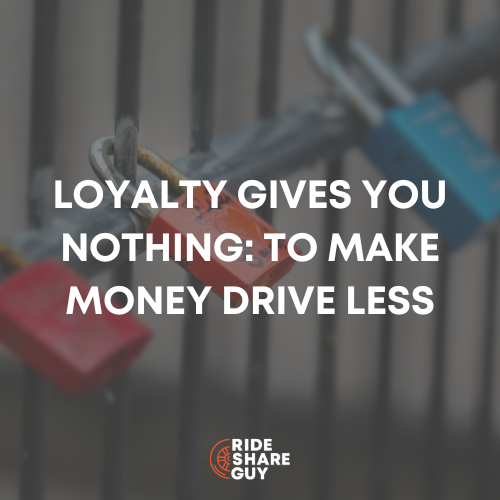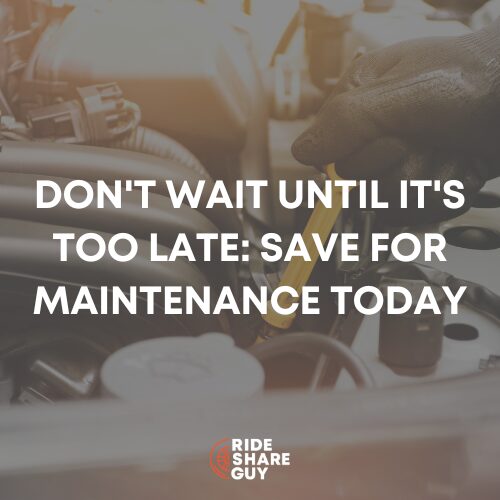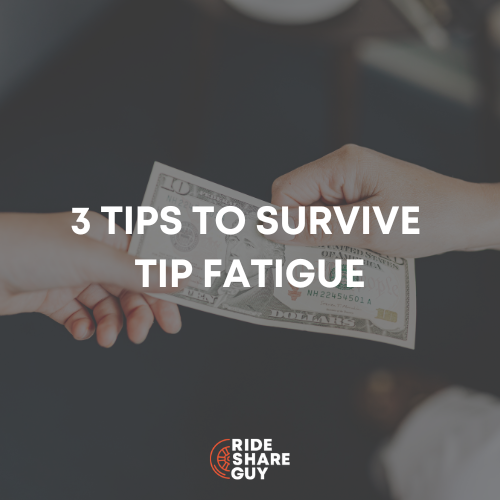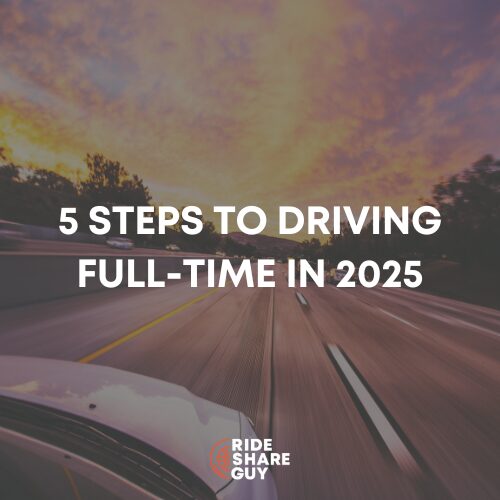Prop 22 passed with a majority vote in the California elections and is poised to take effect in mid-December 2020. It was a hotly debated topic among drivers, labor unions, politicians and the gig companies.
Here are some theories as to why it passed with such a high majority of votes (58.6%), what parts of the state voted against it, compromises that are being offered by Lyft and what’s next for Prop 22.
1. A Slam Dunk Yes on Prop 22
There are several theories that could back this up. One of which is, of course, the money that was invested into advertising and promoting Yes on 22. But, let’s put that part aside for a moment (more on that later) and consider why the general public in California would have voted yes.
I spoke with a driver, Evan, who was adamantly against Prop 22, but he had some interesting thoughts as to why it passed.
Evan explained, “Because we have so much going on now, regardless of which side of the fence you stand on for a party and for the presidential race on down, I feel like they [meaning Prop 22] took advantage of the fact that everybody is kind of distracted right now and distraught right now and really concerned with a lot of things as ‘the bigger picture.’”
He also elaborated that we didn’t really hear anything from the “other side” of the proposition. Not enough information was out there for people to make an informed decision.
It’s easy to assume that if people don’t know what the other side of the story is, they will side with the one they’ve actually heard from, especially when the information was packaged so nicely with a message that people wanted to hear.
Especially drivers. Evan also had a theory that drivers may have sided with Prop 22 because of the key word “flexibility.”
“I think if you’re telling someone they’ll be taking away their ability to be independent with their scheduling—and that’s one of the main, main, main attractions of rideshare driving—that’s all they hear,” said Evan. “It was really effective messaging.”
It’s undeniable that Uber used its platform, as well, to tell drivers and passengers about Prop 22. Uber’s messaging on their app was even subject to a lawsuit, although it was rejected. But Uber (and the other gig companies) had a simple, easy message: Prop 22 = flexibility. They didn’t have to get into the weeds with anything else.
In addition to driver messaging, passenger messaging mattered as well.
Will Coleman, CEO of rideshare company Alto, on Twitter said:
I’ll (respectfully) disagree :). Once something goes to voters, it’s no longer about drivers. It’s about consumers — WAY more of those in the voting pop.
Most people ultimately vote based on self-interests. Consumers get most of the benefits of existing structure…
— Will Coleman (@WColeman84) November 5, 2020
He said this in response to Harry posting: “Would be a much smarter strategy to fight for the things that benefit all drivers. Employee benefits primarily benefit FT drivers but every driver cares about higher pay, too high commission by the companies, unfair deactivations and ratings system, etc.”
In a lot of ways, I have to agree with Will. Since the voting/future of rideshare drivers was decided by the greater voting public within California, it would have been a matter of convincing the consumer as opposed to the much smaller population of drivers.
Of course, Harry has a point as well, that all drivers deserve benefits, most especially those that drivers care about the most.
2. ‘No’ Votes Came from Northern California
There is a large population of people that voted against the proposition. It just wasn’t enough. According to the New York Times, the “no” part of the state consisted mostly of the Sacramento, San Francisco and northwestern coast.
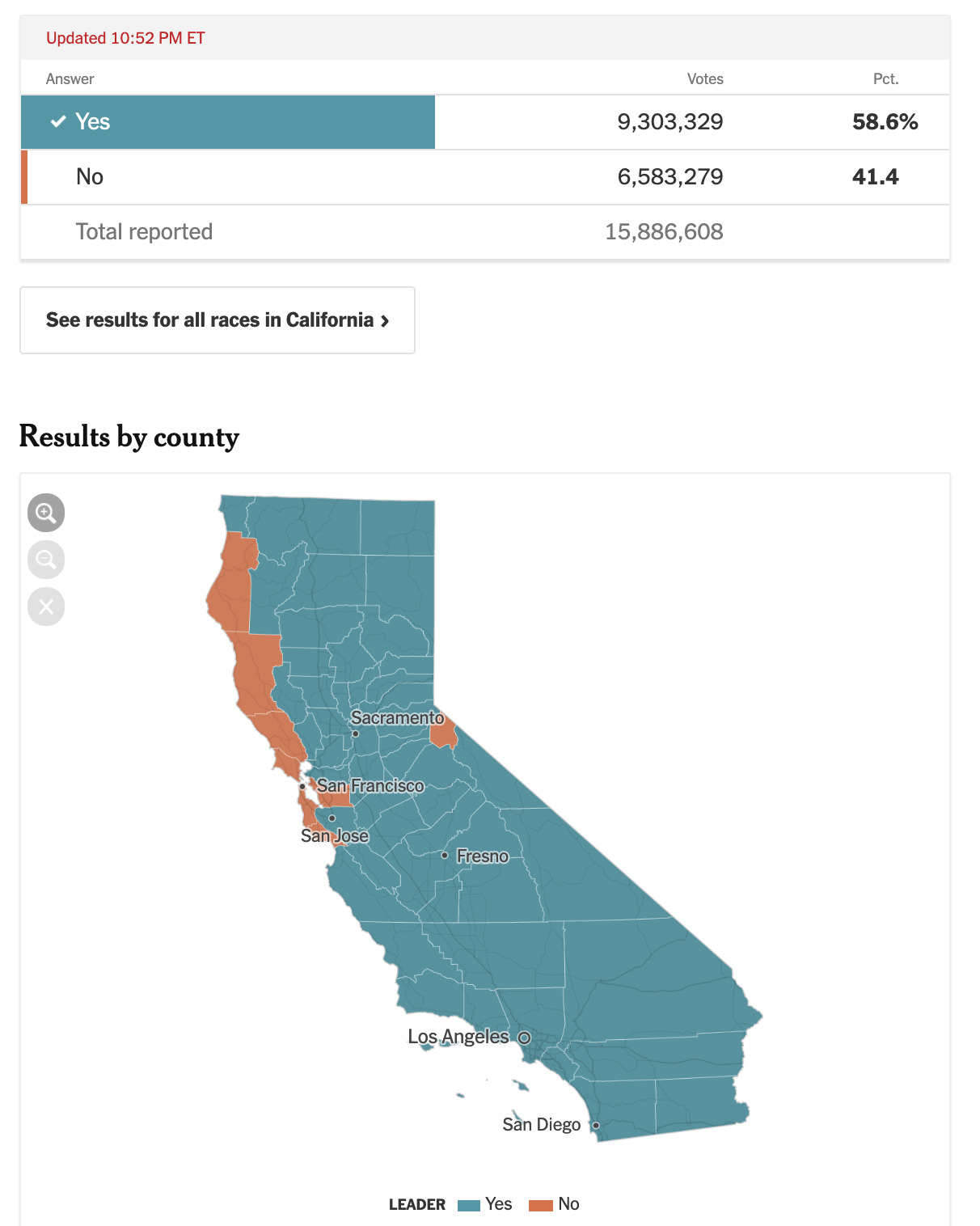 The really interesting information here is that the city where Uber is headquartered didn’t “buy” the information Uber and Lyft and others were pumping into the public. Nearly 60% of San Francisco voted against Proposition 22, the largest rebuke of all counties in California according to SFGate.
The really interesting information here is that the city where Uber is headquartered didn’t “buy” the information Uber and Lyft and others were pumping into the public. Nearly 60% of San Francisco voted against Proposition 22, the largest rebuke of all counties in California according to SFGate.
In the article, SFGate.com writer Grant Marek notes that Southern California received an influx of ‘fake progressive’ mailers supporting Proposition 22, plus the overall threat from Uber and Lyft to leave California if Proposition 22 didn’t pass, as potential reasons why San Francisco voted against Prop 22 but other parts of the state did not (including Southern California).
3. Lyft Wants to Compromise
Perhaps they are not all money-grubbing corporations after all? Well, let’s look at this a little closer before jumping to that conclusion, but Lyft is showing signs of hope for unions.
In the LA Times, writer Taryn Luna noted Lyft’s President John Zimmer is open to compromising with unions. The article stated, “After the company he co-founded notched a decisive victory on Proposition 22 in Tuesday’s election, he said he’s ready and willing to return to the California Capitol and work out a deal that allows the unions that opposed his campaign to represent workers in the industry.”
The LA Times quoted Zimmer as saying, “We’re ready to work with labor leaders and all interested parties who want to move forward and build a stronger safety net. If there’s a way we can work more together, which to me seems totally attainable and seems better, then we should pursue that.”
Just because Prop 22 passed doesn’t mean the fight is over. It’s very possible that labor unions and others will continue to wage battles against Lyft and Uber and the other gig economy companies.
Personally, I’ve wondered if the courts will continue to go after Uber and Lyft to provide back pay to drivers to make up for the fact they weren’t following the law that judges have determined Uber and Lyft were in violation of—especially since Prop 22 isn’t slated to take effect until mid-December. So, as of right now, they are both still violating California labor laws.
4. How Proposition 22 Could Affect Other States
California hasn’t been the only state considering new legislation or trying to make Uber and Lyft follow their current labor laws. Massachusetts has already sued Uber and Lyft over the fact that they are not treating drivers like employees, but should be.
With Prop 22 passing in California, that may lead Uber and Lyft to try something similar in other states to get out of following through with the process of switching drivers to employees. Uber has long advocated for an employment model that’s a ‘third way’, letting workers set their own hours but offering portable benefits. They’ve also advocated for collective bargaining, known as sectoral bargaining, which is different from unionization.
In fact, recently, Uber CEO Dara Khosrowshahi said the ballot win in California should serve as a template for regulating the gig economy in other states and nations. Uber, Lyft, et. al. spent around $200 million toward Prop 22 in California. I doubt they’d want to spend that kind of money elsewhere to skew the game in their favor, but they’ve already proven they are willing to do so.
All eyes will soon be on Massachusetts to see what the future has in store for drivers in that market.
However, Massachusetts isn’t the only one. There’s also New York City that has had scuffles with the two major rideshare giants. Here’s what the Independent Drivers Guild in New York said of the passing of Prop 22:
“Today the Independent Drivers Guild, the largest gig worker organization in the country, responded to California’s passage of Proposition 22, calling upon state legislatures in New York, New Jersey and other states to act quickly to empower gig workers with collective bargaining rights. The IDG is a Machinists Union affiliate which advocates for more than 200,000 Uber and Lyft drivers in New York, New Jersey and Connecticut and has achieved landmark victories for gig workers.”
Their press release also stated:
“The big platform companies may have won in California, but the gig worker fight has only just begun. Proposition 22 leaves California’s gig workers with no representation, no collective bargaining rights, no path to negotiate a livable wage, and no ability to have a real voice in their pay and benefits,” said Brendan Sexton, Executive Director of the Independent Drivers Guild.
“California’s experience should light a fire under pro-worker state legislatures across the country. States need to act now to stand up for their workers,” added Sexton. “Today we call upon legislatures in NY and NJ, as well as other states, to move swiftly to empower these workers and their unions with full collective bargaining rights at the state level and real worker protections. Worker power through collective bargaining, not ballot measures and protracted legal battles, is the only real long-term solution for gig workers.”
Regulators or courts in New York, Illinois and New Jersey have found that at least some drivers must be considered employees for the purposes of eligibility for unemployment insurance. One concern, however, with Proposition 22’s success in California is that elected officials in other blue states, like New York, that are considering California-like laws may back off after witnessing the results of the vote.
5. Did the Amount of Money Influence the Results?
Uber, Lyft, Instacart and the other gig companies backing Proposition 22 ended up spending over $200 million on the ballot measure itself, vastly outspending the ‘Against Prop 22’ vote (which spent $20 million). Did this investment help to sway the election?
Harry, and NYTimes reporter Kate Conger, say ‘not so fast.’ In this tweet exchange by Harry and Kate, there’s a lot more going on than ‘just’ blaming the influence of money on the election, including more cohesive messaging on behalf of the gig companies and a division of labor, which undoubtedly didn’t help clarify their message of why voters should have voted against Prop 22.
There are so many examples this cycle of money not being able to buy an election yet somehow Prop 22 was an anomaly. I don’t think so..
Look at the underlying message, arguments made by no on 22 campaign (weak) and more instead of blaming the $$. https://t.co/A8bDce7bk4
— Harry Campbell (@TheRideshareGuy) November 5, 2020
In addition, there are lessons learned from Austin in 2016: this summary from Vox does a good job of explaining what happened:
“Four years ago, Austin lawmakers introduced a package of rules and regulations affecting Lyft and Uber that would, most significantly, require fingerprinting for their drivers for safety reasons. The companies claimed that this was an unnecessary precaution that would disrupt their ability to sign up new drivers. The two companies spent more than $8 million in a campaign over a single, confusingly worded 2016 ballot question on background checks and other regulations.” – but Uber and Lyft lost, packed up their bags, and left Austin.”
Uber and Lyft came back, but not after spending a record amount of money on that campaign. In the tweet from Harry below, he emphasizes a lack of messaging, not necessarily the funding from Uber and Lyft, as one reason why Prop 22 was successful whereas Austin was not.
Last time Uber/Lyft tried to buy an election in Austin and outspend their opponents 50x, it didn’t go so well.. pic.twitter.com/ndifIpHT3R
— Harry Campbell (@TheRideshareGuy) November 5, 2020
Additionally, what happened in Austin took place in 2016. It’s clear Uber and Lyft learned from that experience and did things differently, like messaging, in 2020.
RSG Analysis
While I’m not from California and didn’t vote on Prop 22, I am a driver. Here are some of my outsider-driver observations. What we learned from Prop 22 in California is important to all of us, especially if/when this type of legislature comes to more states in the near future.
I agree with many who opposed Prop 22 that swallowing anything Uber and Lyft put in front of you is a hard pill and comes with strings attached, whether visible or not. I also am of the opinion that AB 5 may not have suited the average driver. Full-time drivers would have greatly benefited from that kind of benefit structure, but part-time drivers (the majority of drivers) would have been left out in the cold.
I did and do believe Uber and Lyft when they say they cannot flip a switch overnight and magically start calling their drivers employees without a lot of issues plaguing them along the way. I also believe that they would, without hesitation, either leave states that force them to do so or cut drivers out of their platform to accommodate the law.
Or, if nothing else, they would threaten to leave, which would bring a lot of ire from a lot of people—mainly consumers—that rely on the platform.
If you think about it, Uber and Lyft are not that old, and yet so much of us rely on them, either for employment or for transportation…often both. It really makes one wonder “How did we get here?” and “What’s next?” Only time will tell for the latter.
Readers, why do you think Prop 22 was successful in California?
-Paula @ RSG with additional reporting from Melissa Berry
